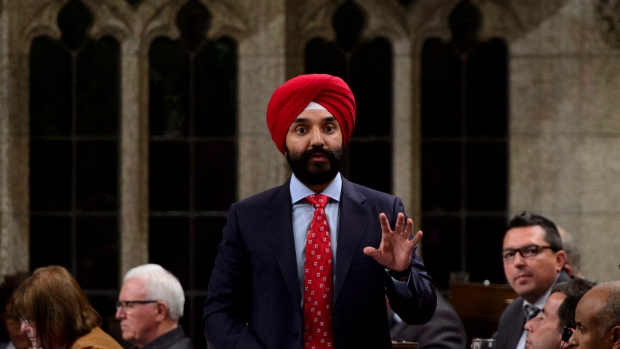Jun 6, 2018
Canada to hold key 5G spectrum auction in 2020, says Innovation Minister Bains
, The Canadian Press

TORONTO -- Canada's government will hold a key auction of wireless spectrum for fifth-generation mobile networks in 2020, Innovation minister Navdeep Bains said Wednesday.
"We believe this puts us in a relatively strong position relative to our international peers," Bains said prior to his speech at the Canadian Telecom Summit in Toronto.
"We will still be ahead of Australia and Germany and will be (among) the top five countries when it comes to making spectrum available for 5G."
Industry players -- particularly Telus -- have called for the auction of 3,500 megahertz spectrum in 2019 in order to keep up with other countries as smartphone makers bring out devices capable of using 5G networks.
On Monday, the chief technology officer for Telus Corp. told the conference that Canadian consumers will be at a disadvantage if the government delays holding the 3,500 MHz auction until 2020.
"You will not be able, as a Canadian, to use the latest Samsung phone, or the latest LG, or the latest Huawei, or even the latest iPhone, till 2021," Telus CTO Ibrahim Gedeon predicted in an interview after his Monday speech.
But Bains, who is minister for innovation, science and economic development, said in an interview Wednesday that his ministry believes 2020 will be soon enough to hold the 3,500 MHz auction.
He also noted that ISED has also previously announced an auction of 600 MHz spectrum in 2019 -- which Bains says has 5G potential -- and that it will hold a 2021 auction of 5G-friendly millimetre-wave spectrum.
Bains said the government's timetable will ensure the 5G friendly spectrum will be available to meet consumer demand for the ultra-fast mobile networks that Canada's major carriers are already putting in place.
Besides the 3,500 MHz band, Bains said the government will hold two other spectrum auctions -- in 2019 and 2021 -- that will also be useful for fifth-generation networks.
"What we want to do is have a proper plan when it comes to the deployment of spectrum," Bains told reporters after his speech.
"That's why we've presented a five-year outlook, to provide the predictability for businesses."
Bains added that it would be up to business to make strategic decisions about how they bring out 5G technology and what adjustments they need to make.
He acknowledged that Canada has some of the world's most expensive telecom prices and said the timing and conditions of wireless spectrum auctions are among the government's tools to stimulate competition.
There's evidence that wireless prices are generally lower in regions of Canada that have competition between multiple carriers.
"The guiding principle for us is more competition," Bains added. "We fundamentally believe that more competition will drive down prices."
He also announced that many of Canada's internet service providers have agreed to provide eligible families with at least 100 gigabytes of landline data service for $10 per month, at a target speed of 10 megabits per second.
A similar approach for wireless data plans is being pursued by the Canadian Radio-television and Telecommunications Commission, an arms-length body within the Department of Innovation, Science and Economic Development that Bains heads.
"I can assure you that as a government we will ... look at every tool in our tool box to drive home the message around affordability."
He said a major review of Canada's broadcasting and telecommunications acts -- which is to provide proposals for new legislation next year -- is focusing on how Canadians can pay less.





